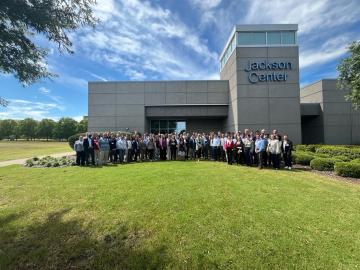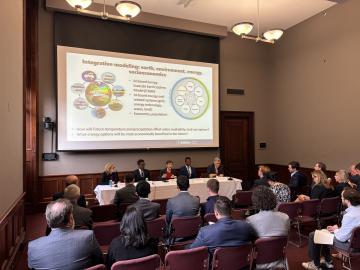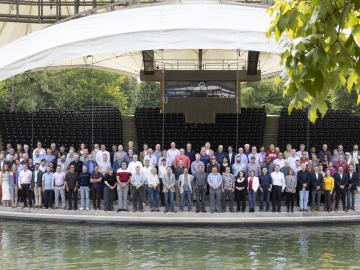
Filter News
Area of Research
- Advanced Manufacturing (1)
- Biological Systems (1)
- Biology and Environment (58)
- Biology and Soft Matter (1)
- Computational Biology (2)
- Computational Engineering (3)
- Computer Science (4)
- Electricity and Smart Grid (1)
- Energy Science (31)
- Functional Materials for Energy (1)
- Fusion and Fission (1)
- Isotopes (7)
- Materials (16)
- Materials for Computing (2)
- Mathematics (1)
- National Security (16)
- Neutron Science (16)
- Nuclear Science and Technology (6)
- Supercomputing (40)
News Topics
- (-) Biomedical (73)
- (-) Machine Learning (68)
- (-) Molten Salt (10)
- 3-D Printing/Advanced Manufacturing (146)
- Advanced Reactors (40)
- Artificial Intelligence (131)
- Big Data (79)
- Bioenergy (112)
- Biology (128)
- Biotechnology (39)
- Buildings (74)
- Chemical Sciences (86)
- Clean Water (33)
- Composites (35)
- Computer Science (226)
- Coronavirus (48)
- Critical Materials (29)
- Cybersecurity (35)
- Education (5)
- Element Discovery (1)
- Emergency (4)
- Energy Storage (114)
- Environment (218)
- Exascale Computing (67)
- Fossil Energy (8)
- Frontier (64)
- Fusion (66)
- Grid (74)
- High-Performance Computing (130)
- Hydropower (12)
- Irradiation (3)
- Isotopes (62)
- ITER (9)
- Materials (157)
- Materials Science (158)
- Mathematics (12)
- Mercury (12)
- Microelectronics (4)
- Microscopy (56)
- Nanotechnology (64)
- National Security (86)
- Neutron Science (171)
- Nuclear Energy (122)
- Partnerships (68)
- Physics (69)
- Polymers (35)
- Quantum Computing (53)
- Quantum Science (92)
- Security (31)
- Simulation (65)
- Software (1)
- Space Exploration (26)
- Statistics (4)
- Summit (71)
- Transportation (103)
Media Contacts

Hempitecture, a graduate of the Innovation Crossroads program, has been awarded $8.4 million by the DOE's Office of Manufacturing and Energy Supply Chains. As part of the grant, Hempitecture will establish a facility in East Tennessee.

A team of researchers used the Frontier supercomputer and a new methodology for conducting a genome-wide association study to earn a finalist nomination for the Association for Computing Machinery’s 2024 Gordon Bell Prize for outstanding

A multi-institutional team of researchers led by the King Abdullah University of Science and Technology, or KAUST, Saudi Arabia, has been nominated for the Association for Computing Machinery’s 2024 Gordon Bell Prize for Climate Modelling.

Plants the world over are absorbing about 31% more carbon dioxide than previously thought. The research, detailed in the journal Nature, is expected to improve Earth system simulations that scientists use to predict the future climate, and spotlights the importance of natural carbon sequestration for greenhouse gas mitigation.

ORNL and NASA co-hosted the fourth iteration of this invitation-only event, which brings together geospatial, computational, data and engineering experts around a theme. This year’s gathering focused on how artificial intelligence foundation models can enable geospatial digital twins.

Biochemist David Baker — just announced as a recipient of the Nobel Prize for Chemistry — turned to the High Flux Isotope Reactor (HFIR) at Oak Ridge National Laboratory for information he couldn’t get anywhere else. HFIR is the strongest reactor-based neutron source in the United States.

The Advanced Plant Phenotyping Laboratory at ORNL utilizes robotics, multi-modal imaging, and AI to enhance understanding of plant genetics and interactions with microbes. It aims to connect genes to traits for advancements in bioenergy, agriculture, and climate resilience. Senior scientist Larry York highlights the lab's capabilities and the insights from a new digital underground imaging system to improve biomass feedstocks for bioenergy and carbon storage.

To bridge the gap between experimental facilities and supercomputers, experts from SLAC National Accelerator Laboratory are teaming up with other DOE national laboratories to build a new data streaming pipeline. The pipeline will allow researchers to send their data to the nation’s leading computing centers for analysis in real time even as their experiments are taking place.

Prasanna Balprakash, director of AI programs for ORNL, discussed advancing climate and weather research through high performance computing and artificial intelligence as part of a September 18 panel for the United States Senate.

The Smoky Mountain Computational Sciences and Engineering Conference, or SMC24, entered its third decade with the 21st annual gathering in East Tennessee.


